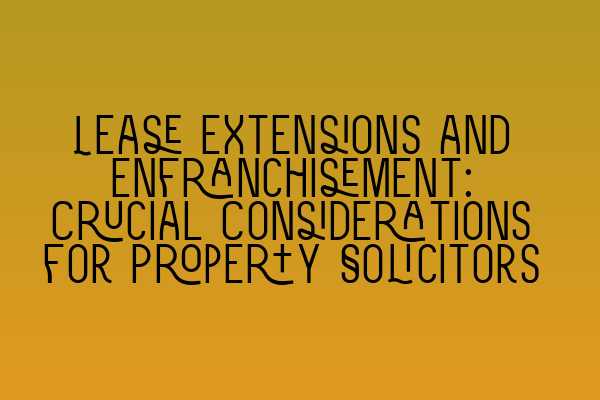Lease Extensions and Enfranchisement: Crucial Considerations for Property Solicitors
As a property solicitor, it’s vital to have a comprehensive understanding of lease extensions and enfranchisement. These are complex legal processes that require careful consideration and expert advice. In this blog post, we will explore the crucial aspects that every property solicitor should be familiar with when dealing with lease extensions and enfranchisement.
1. Understanding Lease Extensions:
Lease extensions are a common practice in property law, especially in the UK, where many properties are leasehold. A lease extension allows a leaseholder to extend the lease term beyond its original expiration date. This can be particularly important for leaseholders who want to maintain control of their property or for those who wish to sell their property with a longer lease term, as this can significantly impact the property’s value.
When handling a lease extension case, it’s crucial to consider the following:
– Assessing eligibility: Not all leaseholders qualify for a lease extension. Understanding the eligibility criteria, such as the length of ownership and the original lease term, is essential. It’s also important to be aware of any exemptions or restrictions that may apply. Providing accurate advice to clients on their eligibility is crucial to avoid unnecessary complications.
– Calculating the premium: The valuation process plays a vital role in lease extensions. As a property solicitor, you will need to assess the value of the lease extension by considering factors such as market value, ground rent, future maintenance costs, and any other relevant factors. It’s essential to have a thorough understanding of the valuation methods and to work closely with expert valuers to ensure a fair and accurate premium calculation.
– Negotiating terms: Lease extension negotiations can be complex, involving multiple parties and potentially conflicting interests. As a property solicitor, your role will be to ensure that your client’s interests are protected. This involves negotiating favorable terms, such as a reasonable premium, an extended lease term, and fair ground rent. It’s crucial to have excellent communication and negotiation skills to achieve the best outcome for your clients.
2. Enfranchisement:
Enfranchisement, also known as collective enfranchisement, is the process by which leaseholders collectively purchase the freehold of their building. This can be an attractive option for leaseholders who want more control over their property and wish to have a share in the management and decision-making process.
Some key considerations in enfranchisement cases include:
– Qualifying for enfranchisement: To qualify for enfranchisement, certain criteria must be met, such as a minimum number of qualifying leaseholders in the building and a minimum percentage of time remaining on the leases. Understanding these eligibility requirements is crucial to determine whether enfranchisement is a viable option for your clients.
– Valuation and funding: Enfranchisement involves valuing the property, negotiating the purchase price, and determining the funding options. As a property solicitor, you will need to work closely with expert valuers and financial advisors to ensure a fair valuation and to assist your clients in exploring funding options such as collective financing or individual mortgages.
– Legal documentation: Enfranchisement requires the preparation and execution of various legal documents, including the Notice of Claim, Participation Agreements, and the Transfer Deed. It’s essential to ensure that all documentation is carefully drafted, legally sound, and meets the necessary statutory requirements. Working with an experienced property law team will help ensure that all legal obligations are fulfilled.
As a property solicitor, staying up to date with developments in lease extensions and enfranchisement is vital. The legal landscape and regulations surrounding these processes may change, requiring ongoing professional development and expertise. By integrating comprehensive knowledge with practical experience, you can provide invaluable advice and support to your clients.
For further study materials and practice quizzes to enhance your property law knowledge, check out our related articles:
– SQE 1 Practice Exam Questions
– SQE 1 Practice Mocks FLK1 FLK2
– SQE 2 Preparation Courses
– SQE 1 Preparation Courses
– SRA SQE Exam Dates
In conclusion, lease extensions and enfranchisement are complex areas of property law that require specialist knowledge and expertise. As a property solicitor, it’s crucial to have a solid understanding of the eligibility criteria, valuation methods, negotiation techniques, and legal obligations involved in these processes. By staying up to date with the latest developments and regulations in lease extensions and enfranchisement, you can provide the best possible advice and support to your clients, while ensuring compliance with the law.
